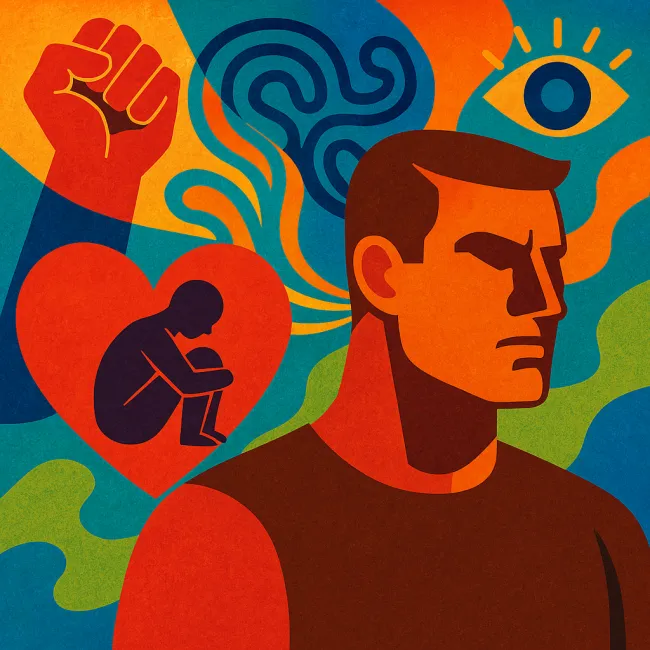
Talk about masculinity today, and the conversation often turns negative. From clumsy dating experiences to online arguments, men are frequently criticised for their behaviour, with some going as far as to label masculinity itself as outdated or dangerous. But is this fair? Or have genuine concerns about men’s wellbeing been lost in louder, more divisive debates?
One phrase you’ll often hear is “toxic masculinity”. It’s used in all sorts of contexts: when a man gets angry in public, when someone dominates a conversation, even when someone holds a door open. It’s become a catch-all term to describe anything seen as a problem with male behaviour.
But originally, the term had a specific purpose. It came from research into men’s health, used to describe certain pressures men face – like always needing to be tough, never showing emotion, or avoiding vulnerability. These pressures can lead to serious problems, including violence, mental health struggles, and early death. The point wasn’t to attack men, but to highlight how some traditional ideas about masculinity can harm men themselves.
Over time, especially online, the term has been stretched far beyond that original meaning. It’s now used so loosely that it can feel more like a political statement than a helpful idea. Instead of encouraging men to reflect on their behaviour, it can come across as blaming them simply for being male.
Of course, some traditional male behaviours are a problem. There’s plenty of evidence linking rigid gender expectations to violence, substance misuse, and men being less likely to seek help. The American Psychological Association has said that traditional views of masculinity – where men are expected to be dominant, emotionally closed, and self-reliant – can lead to worse outcomes in health, education, and relationships. In the UK, men are three times more likely to die by suicide than women, and boys fall behind girls at all levels of education.
But masculinity itself isn’t the issue – harmful behaviours are. If we don’t separate the two, we risk discouraging healthy male traits like resilience, leadership, and strength. These qualities aren’t toxic in themselves. They’re often needed – whether in emergencies, in family life, or in leadership roles.
Right now, boys and young men are often told what not to do, but not given much guidance on what to be instead. Old ideas of what it means to be a man – like being a protector or provider – have been challenged, but nothing clear has replaced them. This leaves many young men unsure of where they fit in. Some turn to online influencers who offer a caricature of masculinity: loud, aggressive, and shallow. It’s not hard to see why this appeals – in the absence of structure, even an extreme version of masculinity can feel like a map.
Psychologists have found that boys benefit from having clear expectations, a sense of purpose, and responsibility. Without that, we often see young men struggling well into adulthood – bored, aimless, and angry.
And this isn’t just a problem for men. Women are affected too – both by the damage caused by emotionally unstable or aggressive men, and by the absence of emotionally mature, confident men. Some women report frustration with men who seem unsure of themselves or overly apologetic for simply being male. What was meant to encourage emotional openness can sometimes go too far, leaving people unsure of how to relate to each other.
Surveys show that while many women want men to be more emotionally honest, they still value qualities like confidence, strength, and dependability in a long-term partner. Removing traditional masculine traits completely doesn’t always lead to better outcomes for anyone.
Women also help shape social expectations, through what they encourage, accept, or criticise. So, any rethinking of masculinity needs to involve both men and women.
The key point is this: masculinity isn’t the enemy. Certain behaviours and rigid expectations are. When masculinity is expressed in a healthy way, it brings benefits to individuals, families, and society. Traits like courage, loyalty, and discipline have helped build and protect communities for generations. None of these need to be discarded – they just need to be directed wisely.
Instead of blaming boys and men, we need to offer better guidance. Help them understand the difference between being strong and being aggressive, between being emotionally open and emotionally unstable. Encourage responsibility without shaming. Provide structure, not just criticism.
Men are still much more likely to die by suicide, do worse at school, and avoid getting help for mental health issues. These are serious problems that need practical solutions – not just slogans.
If we want better outcomes for men and boys, and for the people around them, we need a clear, balanced view of masculinity. Not one that tears it down, but one that rebuilds it – with purpose, responsibility, and room for growth.